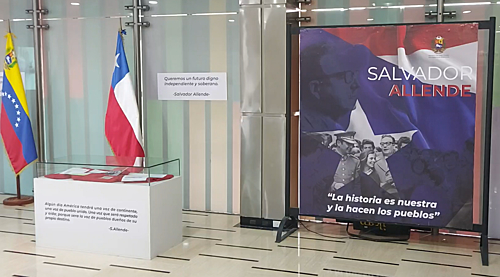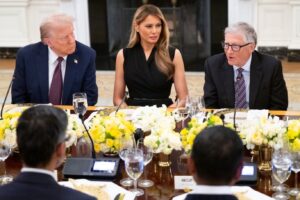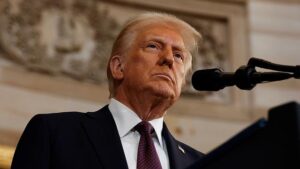
The historical and geographical distance between Chile and Venezuela does not prevent the government of former socialist president Salvador Allende from being one of the experiences most sought after by the Venezuelan left. In the week in which the victory of Popular Unity turns 53 and the coup d’état that overthrew Allende turns 50, Venezuela opened an exhibition on these decisive episodes in Chile’s history.
Entitled “History is ours and the people make it”, the exhibition was carried out by the Ministry of Foreign Affairs in partnership with the Chilean Embassy in the country and features photographs and documents about different phases of the Allende government, from the electoral victory to the overthrow , on September 11, 1973.
The name of the exhibition refers to Allende’s last speech, broadcast on the radio on the day of the coup moments before La Moneda Palace, headquarters of the Chilean Executive, was bombed by coup troops commanded by General Augusto Pinochet. The violent act marked the beginning of a bloody dictatorship that lasted 17 years and left thousands of exiles, dead and politically disappeared.
Daniel Retamal Muñoz, who at the time of the coup was an engineering student and member of the Communist Party, was one of the Chileans who had to leave his country due to the political persecution initiated by the dictatorship. To the Brazil in facthe says that he went underground on the same day of the coup and in 1978 traveled to Venezuela, where he still lives today.
::What’s happening in Venezuela::
“We knew that the fascist coup would come, but we never imagined what it would be like. Despite reading many books about fascism, watching films about fascism, we never imagined that it would be implemented in Chile in the way it was”, he says.
Muñoz, who today presides over the Venezuelan Pablo Neruda Foundation, was one of the Chileans who went into exile in Venezuela and who were honored during the opening of the exhibition. He says that clandestine work against the Pinochet regime was active, but that after the disappearance of communist leaders in 1976, the siege against opposition political activities tightened even more.
Chilean Daniel Retamal Muñoz went into exile in Venezuela after the 1973 coup d’état / Lucas Estanislau
“I was lucky, to say the least, because I didn’t lose my life during the coup. I saved myself and that led me to fulfill what Allende always told us that despite defeats, one must always think that there is a possibility of victory and we are working towards it”, he states.
Chilean way and 21st century socialism
The historical ties between the Chilean and Venezuelan experiences were also addressed by Chile’s ambassador to the country, Jaime Mujica. Newly appointed, after Santiago and Caracas spent years with relations broken by decision of former president Sebastián Piñera, the diplomat stated that Allende’s socialist government left a legacy for multilateral relations in the region.

“I consider that Allende’s concept that ideological borders should not be established in Latin America and that cooperation and integration between countries with governments of different political and ideological affiliations are fundamental has a very current resonance,” he said.
Venezuelan Foreign Minister Yván Gil, who also participated in the inauguration, congratulated the presence of the Chilean authority for marking a reestablishment of relations and called for unity between the countries to “combat neo-fascism”.
::One year after the ‘no’, the new Chilean Constitution is open and in the hands of right-wing parliamentarians::
“The resurgence of fascist forces is beginning to be a source of destabilization of governments. I think it is time for our governments, beyond these ideological discussions that they intend to impose on us, to begin to move along the path of unity in order, precisely, to protect ourselves from these attacks,” he said.
During the exhibition, participants also compared Allende’s arrival to the Presidency through elections with the victory of former president Hugo Chávez in the 1998 elections, a recurring debate among Venezuelan popular movements.
For historian Eduardo Scheidt, professor at UERJ and researcher of the Allende and Chávez governments, the two experiences have similarities as they “would be a proposal for the construction of socialism through democratic and institutional means”.
::’It’s been 50 years and still no justice has been done’, familiar snake of those disappeared during the Chilean dictatorship::
“Both Allende and Chávez were elected by popular vote and proposed to start a revolution while maintaining democratic institutions and political freedoms (including for opponents) without resorting to insurrections or civil wars”, says the professor.
Scheidt also recalls that “in both cases, socialism proposals did not adhere to models or copies of experiences from other countries, as they argued that socialism must be built based on the specific realities of their societies.”
“For these reasons, Allende’s project became known as the ‘Chilean road to socialism’ and the ’21st century socialism’ defended by Chávez was also critical of the socialist experiences of the 20th century and does not even consist of any finished theoretical model, he argues that socialism must be ‘invented’ by societies based on their specific historical experiences and realities”, he says.
::Colonel who met Chávez in 1986 spent the last decade guarding the former president’s tomb::
The historian also points out some fundamental differences in the processes, such as the fact that Chávez has a military background, unlike Allende, and that the former Venezuelan president emerged victorious from an attempted coup d’état in 2002, which aimed to overthrow him from power.
“It can be said that Chávez’s return in 2002 was the victory that Allende did not have in 1973, as both Allende and Chávez faced strong opposition from the national ruling classes, most of the middle classes and North American imperialism, but the different results occurred for countless reasons, starting with different historical contexts”, he states.
Editing: Thales Schmidt
Source: www.brasildefato.com.br

